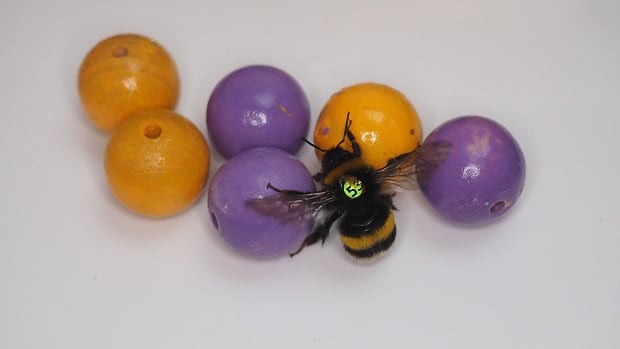As It Happens6:10Bumblebees play with balls just for fun, study finds
Bumblebees, it appears, are quite playful — especially when they’re young.
A new study out of the U.K. found that if you give bumblebees tiny wooden balls, they’ll spend time moving them around, seemingly just for fun. And the younger the bee, the more time they spend playing.
“We think it’s rewarding,” bee researcher Samadi Galpayage told As It Happens host Nil Köksal. “There’s more to bees than just being pollinators. They have really interesting behaviours, actually, and they’re quite clever little creatures.”
Galpayage, a PhD student at Queen Mary University’s Bee Sensory and Behavioural Sciences Lab in London, is the first author of a new study into the phenomenon. The findings were published last month in the journal Animal Behaviour.
Not about food or sex
The researchers stumbled upon the behaviour while working on a different study, in which they trained bees to push balls in exchange for sugary treats.
But they noticed the playful pollinators kept on pushing the balls around even when they weren’t getting rewarded.
“We saw this phenomenon and we wondered: What’s happening here? Why are the bees doing this? Are there specific bees that are doing this? Do they do this repeatedly?” Galpayage said.
“And so we designed these new series of experiments to test whether this could be something like play.”
In the new study, 45 bumblebees were given small wooden balls. This time, there was no reward system. The bees also had unrestricted access to an “all-you-can-eat” buffet of sucrose solution and pollen, Galpayage said.
Still — even with no incentives — they played.
Here’s how it looks: A bee, Galpayage said, walks toward a ball and places its two front legs on it. Then, it rotates the ball until it’s holding it in all six legs, almost as if hugging it.
Once the bee has a good grip on the ball, it scoots backwards on its butt and pulls the ball towards itself, rotating it along the way.
“Of course, I have to be objective,” Galpayage said. “But, of course … I can’t help but feeling amused by it.”
WATCH | Bumblebees at play:
The study focuses on balls, but the bees appear to enjoy all sorts of toys. Galpayage says she’s observed the same behaviour after giving them bottles and foam cubes.
“So it’s not so much about the object itself, but it seems to be the behaviour, the action of this rotation, that seems to be appealing to the bees.”
This rotation, she said, is not something that bees would do when foraging food or collecting pollen, and they weren’t getting treats for their tricks, so there’s no indication this is food-motivated behaviour.
Nor do they appear to be trying to mate with the objects, she said. Female bees engaged in the play alongside males, even though only males and queens are involved in mating.
What’s more, male genitalia does not make an appearance during this playful activity as it would during reproduction.
The ‘rich sensory and cognitive life’ of bees
Still, food may still play an indirect role in explaining the behaviour, says beekeeper Shelley Hoover, a biological sciences researcher at Alberta’s University of Lethbridge.
“Bees, particularly bumblebees, forage on diverse and complex flowers, and so need to be able to solve these flower puzzles to access the nectar rewards the flowers offer,” she said in an email. “Learning is a very important part of being a good forager, and play is often associated with learning.”
She says the study highlights yet another example of the complex inner workings of bumblebees.
“There are a number of important implications of the study, but to me the most important is that we are starting to recognize the rich sensory and cognitive life that bees lead,” she said.
“Just like us, they use intelligence and learning to solve problems in their everyday life; they have preferences and personalities; and yes, they play.”
Sheila R. Colla, a bumblebee ecologist at York University in Toronto, agrees.
“I think a main takeaway from this study is that there is still so much to learn about the insect world. Insects are more intelligent than we give them credit for,” she said. “As a conservation scientist, I hope we keep pollinators around to be able to learn more from them.”
Galpayage says bees already have a positive reputation among humans for their work as pollinators — but there’s so much more about them to appreciate.
“I hope that with this sort of research — where we get at the questions of whether bees experience something like pleasure or something like pain — that maybe we start to feel more empathy towards bees and other insects,” she said.
“A bit like we do with our pets or like larger animals that we protect.”


